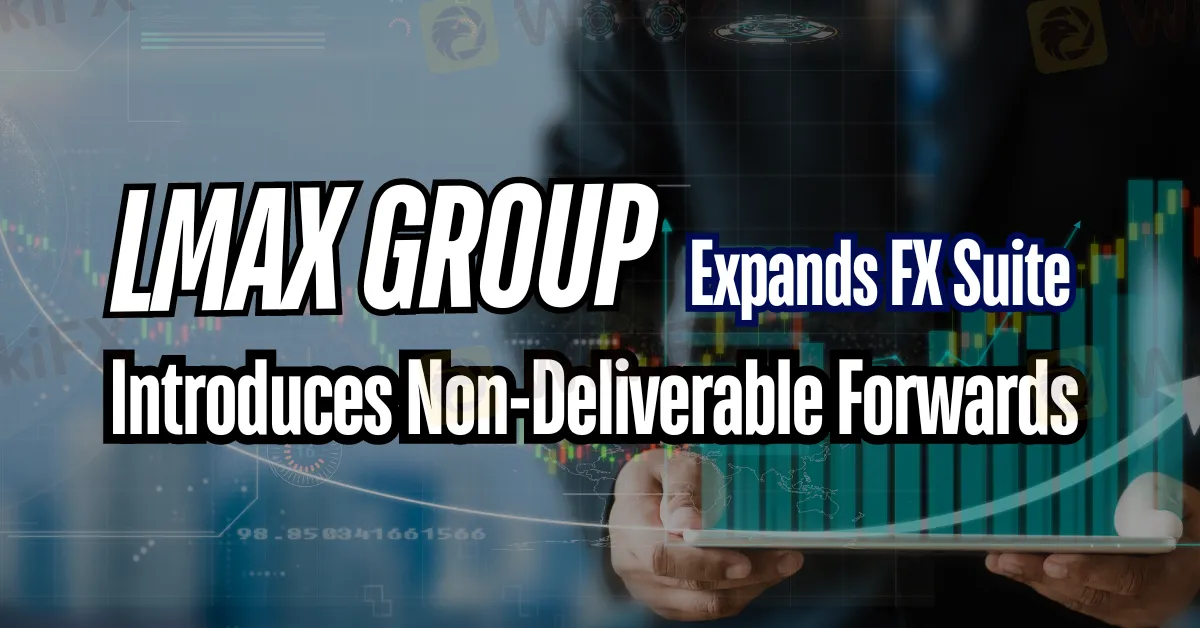简体中文
繁體中文
English
Pусский
日本語
ภาษาไทย
Tiếng Việt
Bahasa Indonesia
Español
हिन्दी
Filippiiniläinen
Français
Deutsch
Português
Türkçe
한국어
العربية
LMAX Group Expands FX Suite: Introduces Non-Deliverable Forwards
Abstract:LMAX Group, a provider of institutional trading venues for foreign exchange (FX) and digital assets, has substantially enhanced its FX product suite with the introduction of Non-Deliverable Forwards (NDFs), addressing the escalating demand for such instruments, notably in the Asia Pacific region.

LMAX Group, a provider of institutional trading venues for foreign exchange (FX) and digital assets, has substantially enhanced its FX product suite with the introduction of Non-Deliverable Forwards (NDFs), addressing the escalating demand for such instruments, notably in the Asia Pacific region.

Non-Deliverable Forwards (NDFs) represent specialized financial instruments utilized within foreign exchange markets, closely resembling traditional forward contracts with a crucial deviation: the currencies involved cannot be physically delivered upon maturity. In an NDF agreement, two parties commit to exchanging one currency for another at a predetermined exchange rate (the “forward rate”) at a future date. Unlike standard forward contracts, the actual exchange of currencies does not occur upon contract expiry. Instead, settlement transpires by offsetting the difference between the agreed-upon exchange rate and the prevailing spot exchange rate at the time of settlement. The party owed money receives the difference in cash. NDFs prove particularly beneficial in environments characterized by currency exchange controls or restrictions, such as emerging markets, or where regulatory constraints exist. They serve as a critical tool for hedging against currency risk, allowing businesses operating in volatile currency markets to secure exchange rates for future transactions. Additionally, NDFs offer avenues for speculation, appealing to investors and traders seeking to capitalize on anticipated movements in currency exchange rates. Overall, Non-Deliverable Forwards provide a pragmatic means for parties to manage currency risk and conduct transactions in markets where traditional currency exchange may be impeded or impractical.
The newly launched NDFs by LMAX Group will be available for trading on two key LMAX Exchange matching centres: Singapore (SG1) and London (LD4). This follows the successful acquisition of a Recognized Market Operator (RMO) license from the Monetary Authority of Singapore (MAS) by LMAX Exchange in November 2023.

The exchange operates on a central limit order book (CLOB) model, fostering transparent price discovery and execution for a diverse range of market participants, including banks, non-bank institutions, proprietary trading firms, brokers, asset managers, and other buy-side entities.
Matt DellaRocca, Head of Liquidity and Analytics for APAC at LMAX Exchange, highlighted the advantages for local market participants, emphasizing access to a deeper pool of NDF liquidity through a regulated exchange platform. The CLOB model further ensures an efficient market structure, facilitating transparent, precise, and consistent execution.
This initiative aligns with LMAX Group's dedication to expanding its FX offerings globally, with a particular focus on serving customers in the Asia Pacific region. Initially, the launch prioritizes this region, addressing the growing demand for FX NDFs and institutional liquidity, and is anticipated to contribute to the overall enhancement of the FX market structure in the area.
The initial product offering encompasses major Asian currency pairs against the US dollar (USD), including the Indian Rupee (INR), South Korean Won (KRW), New Taiwan Dollar (TWD), Chinese Yuan (CNY), Indonesian Rupiah (IDR), Philippine Peso (PHP), and Malaysian Ringgit (MYR). LMAX Exchange plans to introduce LATAM currency crosses in the future.
The launch has received positive industry feedback. Paul Buttenmueller, Global Head of eFX Trading at UBS, acknowledged the significance of this development, citing LMAX Exchange's NDF offering as a pivotal step forward in solidifying Singapore's position as a crucial hub for FX price discovery. This initiative is expected to enhance market access to local pricing for Asian emerging market currencies, ultimately fostering liquidity and propelling NDF volume growth.

Disclaimer:
The views in this article only represent the author's personal views, and do not constitute investment advice on this platform. This platform does not guarantee the accuracy, completeness and timeliness of the information in the article, and will not be liable for any loss caused by the use of or reliance on the information in the article.
Read more

Never Heard of Dynasty Trade? Here's Why You Should Be Worried
Have you heard this name before? No , it’s time you do because staying unaware could cost you. This platform is currently active in the forex trading and has been linked to several suspicious activities. Even if you’ve never dealt with it directly, there’s a chance it could reach out to you through ads, calls, messages, or social media. That’s why it’s important to know the red flags in advance.

Want to Deposit in the EVM Prime Platform? Stop Before You Lose It ALL
Contemplating forex investments in the EVM Prime platform? Think again! We empathize with those who have been bearing losses after losses with EVM Prime. We don't want you to be its next victim. Read this story that has investor complaints about EVM Prime.

WEEKLY SCAM BROKERS LIST IS OUT! Check it now
If you missed this week's fraud brokers list and are finding it difficult to track them one by one — don’t worry! We’ve brought together all the scam brokers you need to avoid, all in one place. Check this list now to stay alert and protect yourself from fraudulent brokers.

Catch the Latest Update on BotBro & Lavish Chaudhary
BotBro, an AI-based trading platform, became popular in India in 2024—but for negative reasons. Its founder, Lavish Chaudhary, who gained a huge following by promoting it heavily on social media. Since then, he has become well-known, but for many controversies. Let’s know the latest update about Botbro & Lavish Chaudhary.
WikiFX Broker
Latest News
RM750 Million Lost to Investment Scams in Just Six Months
5 things to know before the Thursday open: Meme stock revival, Trump's Fed visit, Uber's gender feature
Why Octa Is the Ideal Broker for MetaTrader 4 & 5 Users
CNBC's Inside India newsletter: Leaving, but not letting go — India's wealthy move abroad, but stay invested
Moncler raises prices on tariffs, may postpone store openings if downturn worsens
Titan FX Adds WhatsApp and Telegram for Enhanced Support
Nestle flags further potential price hikes as tariffs, commodities weigh on margins
Stop Level Forex: How Does it Help Traders Prevail When Losses Mount?
eToro Launches Spot-Quoted Futures Trading in Spain
Titan FX Introduces Redesigned Client Cabinet for Enhanced Usability
Currency Calculator


